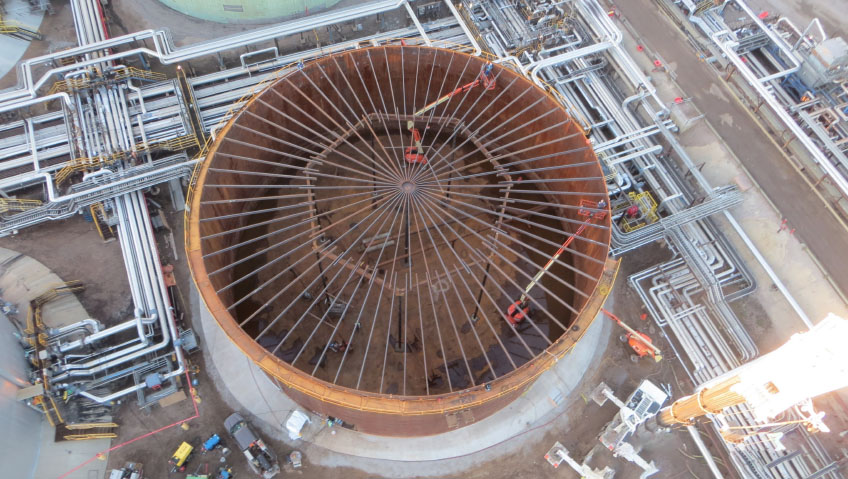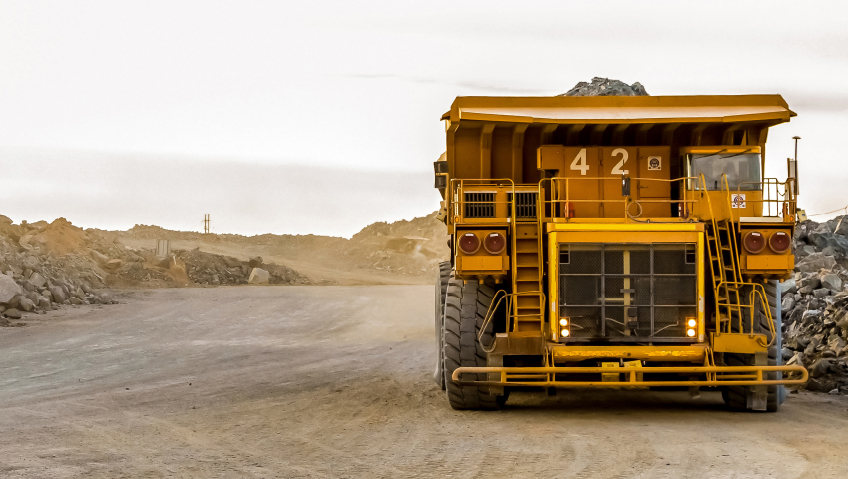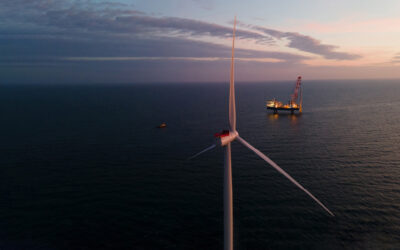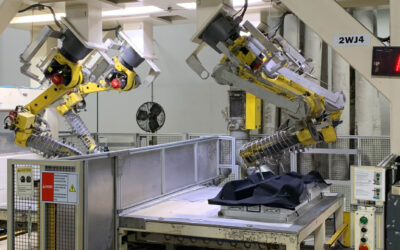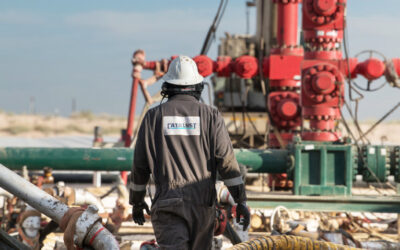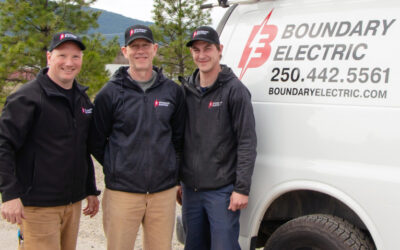To achieve robust worker safety in the oil and gas storage and transport industry, stringent standards are required; spills and accidents – such as explosions and inhalations – due to lax safety standards can lead to devastating environmental impacts, in addition to severe risks for workers.
In the heart of Canada’s Energy Province, one company has emerged as the natural leader in this necessary field. With nine years in business so far, Prolium Industries offers bold new technology to make oil and gas tank cleaning and storage easier, safer and more convenient than ever before.
Company founder and President Brad Cruikshank joined several other engineers to start his company back in 2012. “We were fortunate that we had a large market in Canada’s oil and gas sector, and we just saw a niche in the industry,” he remarked when we first interviewed him two years ago.
Now, and in a very different world, Prolium has expanded beyond its headquarters outside Calgary to field offices in Newfoundland and just outside Edmonton. With this national reach, Prolium can coordinate tank cleaning and servicing efforts anytime, anywhere.
With its highly specialized staff, Prolium’s team can work with clients and inspectors to ensure all tank operations meet API653-code standards. Additionally, the company’s engineers work equally closely with all clients over design specifications. Ensuring all potential discrepancies or design conflicts are identified, Prolium can then advise the best project route in terms of safety and efficiency.
Indeed, Prolium can handle all aspects of tank servicing and cleaning in-house, thanks to its versatile staff. General contracting and construction management services ensure proper procurement, scheduling and budget tracking, as well as key performance indicators and quality control.
Qualified technicians and labourers provide both CWB and B-Pressure welding and pipefitting. Finally, Prolium’s fabrication facility ensures any needed components, such as pipes or other structures, can be fashioned to spec.
With all the services for tank cleaning and servicing available in-house, Prolium is also able to manage every aspect of projects through its industry-leading cost-control system.
Cruikshank notes how the company has earned a reputation of dependability with predictable results. “Prolium has a reputation for doing repeat business with major oil and gas producers, transporters and refiners,” he says, adding that Prolium’s ability to develop accurate estimates and consistently meet targets sets it well above industry averages. “Our cost controls system is as industry-leading as our safety program.”
Prolium’s cost control system maximises efficiency, arguably the most important project success factor in a service-based industry. “Our control system allows us to reduce the overall schedule for any given project to take place, ultimately reducing costs to our clients regardless of market conditions,” Cruikshank says. An experienced team of project managers also helps deliver consistent results on or under budget.
This experienced team is an extension of Prolium’s own business model. On each project, Prolium’s assigned team works so closely with clients that they are almost regarded as employees by completion of the task.
While these clients learn to share Prolium’s philosophy of safety, quality, and efficiency, and tend to offer repeat business, Prolium’s teams increase their reliability and efficiency with experience gained on specific projects. Over time, designated and highly specialized teams will be available for equally specialized tasks.
“This business model has been incredibly successful with many of our largest clients across Canada,” Cruikshank says.
All these in-house services occur under Prolium’s safety umbrella. Prolium’s commitment to safety remains the company’s primary motivator, and its enduring success. Over the past three years, the company’s technicians have logged over 500,000 exposure hours without a single recordable injury, lost workday, or recordable incident report.
These numbers are simply the best vindication of Prolium’s commitment to safety standards, and the workplace culture it has built to support this.
In its most recent developments, Prolium and its subsidiary Proterra Energy have expanded their service portfolio to include oil-carrying railcars. “Over the past year, the Prolium Group has increased its focus on innovative solutions for entry-less tank cleaning, which adds a huge factor of safety by eliminating or reducing risks associated with these types of work activities,” Cruikshank reports.
While there is less demand on oil pipelines, Cruikshank remarks how demand for oil tank railcars has increased to fill the gap. Without giving away insider info, he explains how Prolium can now clean rail cars containing crude oil, heavy fuel oil, asphalt and other heavy, fume-rich products mostly without the need for any human entry.
“This can be done right at a client’s job site, saving them time and money by not having to mobilize their rail cars to a fixed cleaning/repair facility.”
With Prolium’s experience in both confined-space and entry-less cleaning solutions, this was a natural evolution and extension of the company’s skill. Thanks to Prolium’s previous experience in remote cleaning, Cruikshank remarks how this niche skill sets it above its competitors.
“From what we can tell, our competition simply can’t compete with us from a safety or technology standpoint, which ultimately reduces the overall cost to our customers,” he says. The new technology not only reduces exposure man-hours, thereby reducing safety risks, but is also faster than other leading cleaning methods.
Prolium has even further intensified its commitment to worksite safety over the course of the pandemic. “We encourage a high volume of reporting of hazard IDs and ‘near misses’,” Cruikshank reports.
An internal company committee comprising representatives from the company’s offices across Canada makes constant reports and revisions “almost in real time,” as Cruikshank describes it. “With this approach, we can react proactively instead of reactively when it comes to safety, keep our employees vigilant and safe, and projects running smoothly.”
As a result, the company’s operations have been left largely untouched by COVID-19. “We were able to understand the risk; develop and implement safe working procedures almost immediately,” Cruikshank says, “and as a result, COVID has had little direct impact on our ability to keep people working.”
As experts in worksite safety, Prolium’s staff views COVID as simply another risk to its workforce, albeit a more serious one. But thanks to its track record, the company is again proving itself a beacon for others to follow.
“In many cases, our clients have looked to us as the example of how to safely perform work through the pandemic,” Cruikshank says.
In a rapidly changing labour and energy market, Cruikshank credits his team and Prolium’s business model for the company’s ongoing success. Through years of economic upheavals, pandemics and climate change, Prolium and its staff have continued to adapt.
“Since inception, we have maintained key individuals and crews who enjoy working for Prolium because of the culture and pride in workmanship,” he says. “I believe that nine years of being in business is a testament to our employees’ commitment to our values, level of safety and our approach to long-term client relationships.”
As our world enters a post-COVID era, Prolium is ready to help the energy sector regain its strength. Canada’s oil and gas industry has some of the most stringent safety and production standards in the world, and Prolium is well-positioned to help players operate in this challenging industry in an acceptably safe and efficient way.
New technologies in carbon emissions reduction, plus new energy sources such as Liquid Natural Gas (LNG) and hydrogen will provide access for new players. “We are proud to be a part of the Canadian energy industry and look forward to being involved in the energy transition,” Cruikshank says.
Canada will still need intelligent and talented individuals who will lead the nation through its energy transition, he says, and adds, “As Canadians, we simply need to continue to support Canadian oil and gas.”

